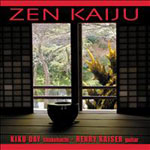Home » Jazz Articles » Album Review » Kiku Day / Henry Kaiser: Zen Kaiju
Kiku Day / Henry Kaiser: Zen Kaiju
The title of this stunning meeting of minds supposedly represents what Day and Kaiser bring to the table. It defines a clash between the meditative, serene and introspective side of Zen, and the reckless, vocal, violent mutation of the Kaiju—which translates to strange beast in Japanese and refers to the generic name for Gojira, the famous Godzilla and extended family of mutated/strange creatures that starred in a 1960s wave of monster films. It is clear that Kaiser is also an expert in that field; all twelve pieces portray vivid meetings of extremes between all sorts of Kaiju in times when they are called to reflect upon their deeds, in a kind of spin on the Japanese wabi-sabi aesthetic concept.
The most amazing thing about this recording is that both Day and Kaiser are able create a new common ground, one that references the disciplined shakuhachi tradition, but moves onto another plain. In their tight and intimate timbral explorations, Day uses the shakuhachi as a drone instrument, while Kaiser bends and sustains notes indefinitely on guitar. When she slurs or shouts on the bamboo flute, he lightly distorts the sound and squeezes the strings as a metallic percussion instrument. While she investigates microtones and multiphonics he caresses and gently rubs the strings, and when he tries to dictate a vague rhythm she offers sympathetic and subtle dance-like sentences. Kaiser plays in a much more restrained manner than usual, opting for more a precise and subtle extension of Day's language; but such a nuanced approach pays off, since it leaves much more room for the colorful and suggestive sounds of both to linger on.
Day and Kaiser are powerful improvisers with a wealth of ideas and an endless need to open new sonic vistas. This unique recording suggests a new way towards a sonic enlightenment—unconventional, selfless and compassionate as Zen enlightenment, but also a liberating one from our sonic or life conventions and costumes, just as Bailey suggested.
Visit Kiku Day and Henry Kaiser on the web.
Track Listing
Gojira Examines a Monk in Meditation; Anguiras Pacifies the Mind; Fairy Mothra's Preaching Sign, Gyaos Washes the Bowl, Dagora Calls His Own Master; Varan's Wheel, Gamera's Dog, This Mind is Not Pigmon, Ultraman Investigates, Jiger Twirls a Flower; A Philosopher Asks King Ghidorah; Tripping Over the Oxygen Destroyer.
Personnel
Henry Kaiser
guitarKiku Day: ji-nashi shakuhachi; Henry Kaiser: electric and acoustic guitars.
Album information
Title: Zen Kaiju | Year Released: 2007 | Record Label: Balance Point Acoustics
< Previous
John Taylor's Jazz Caricatures: Canno...
Next >
Nothing but Blue Sky
Comments
Tags
For the Love of Jazz
 All About Jazz has been a pillar of jazz since 1995, championing it as an art form and, more importantly, supporting the musicians who create it. Our enduring commitment has made "AAJ" one of the most culturally important websites of its kind, read by hundreds of thousands of fans, musicians and industry figures every month.
All About Jazz has been a pillar of jazz since 1995, championing it as an art form and, more importantly, supporting the musicians who create it. Our enduring commitment has made "AAJ" one of the most culturally important websites of its kind, read by hundreds of thousands of fans, musicians and industry figures every month.




















